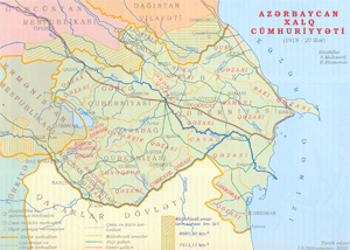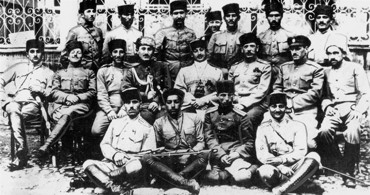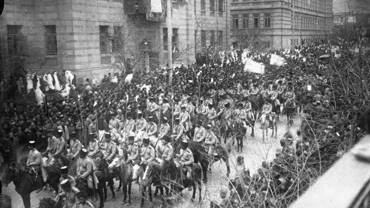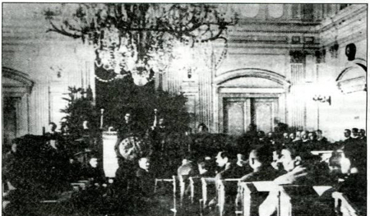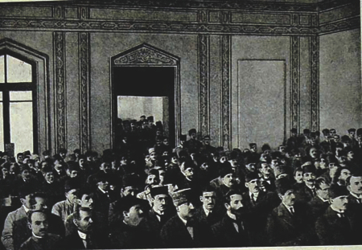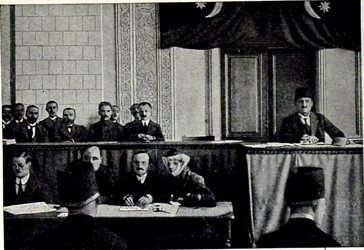The creation of the Azerbaijan Democratic Republic on May 28, 1918 has forever entered the life of the Azerbaijani people as a great and significant event. This date is solemnly celebrated as Republic Day. In February 1917, the monarchy was overthrown in Russia. The Provisional Government held elections to the Constituent Assembly. However, the Provisional Government could not remain in power for long. In October 1917, a coup d'état took place. Consequently, the deputies elected to the Constituent Assembly from the South Caucasus could not go to Russia. On February 14, 1918, the Transcaucasian Seim-Transcaucasian Parliament, the highest governing body of the South Caucasus, was established in Tbilisi (Georgia). The Seimas was represented by 44 deputies who, in the elections to the Constituent Assembly of the Muslim faction, received the votes of more than one million Turkish Muslim voters in Azerbaijan, as well as throughout the South Caucasus. The Muslim faction, or Muslim council, was essentially a Transcaucasian Muslim parliament. As in the State Duma, the most consistent members of the Transcaucasian Seim were representatives of Azerbaijan. At their request, on April 9, 1918, the Transcaucasian Seim proclaimed the independence of the Caucasus and the United Transcaucasian Republic was created. However, acute conflicts of national interests did not allow the Transcaucasian Sejm and the Transcaucasian Republic to take concrete steps. As a result, on May 25, 1918, the Georgian delegation left the Seim and on May 26, declared the independence of Georgia. On May 27, 1918, members of the Muslim faction, that is, the Transcaucasian Muslim Council (Transcaucasian Muslim Parliament), also held a separate meeting and decided to declare the independence of Azerbaijan. To this end, the Transcaucasian Muslim Council declared itself the National Council of Azerbaijan, or rather, the Parliament of Azerbaijan. Thus, in fact, the first parliament in the history of Azerbaijan was created and the foundation of the first parliamentary republic was laid. At this meeting, the Presidium and Chairman of the National Council of Azerbaijan were elected. M. Rasulzade became the chairman of the National Council. On May 28, a historical meeting of the National Council of Azerbaijan was held under the chairmanship of Hasan bey Agayev. Hasan bey Aghayev(chairman), Mustafa Makhmudov (secretary), Fatali Khan Khoyski, Khalil bey Khasmammaddov, Nasib bey Yusifbeyli, Mir Hidayat Seyidov, Nariman bey Narimanbeyov, Heybat Gulu Mammadov, Mehdi bey Hadjinski , Ali Asker bey Mahmudbeyov, Asian bey Gardashov, Sultan Madjid Ganizade, Akbar Agha Sheykhulislamov , Mekhdi bey Hacibababeyov, Memmed Yusif Djafarov, Xudadat bey Malik-Aslanov , Rahim bey Vakilov, Hamid bey Shakhtakhtinski, Firudin bey Kocherlinski, Djamo bey Hadjinski, Shafi bey Rustembeyov, Xosrov Pasha bey Sultanov, Djafar Akhundov, Mahammad Maharramov , Djavad Malik- Yeganov and Hadji Molla Salim Akhundzade who attended in the meeting accepted the Declaration of Independence of Azerbaijan. The Declaration of Independence proclaimed the creation of the most democratic republican system of government in Azerbaijan - a parliamentary republic - for the first time in the entire Turkic-Muslim world and in the East as a whole. This is stated in the Declaration of Independence of the National Council of Azerbaijan:
-
From now on, just as the people of Azerbaijan have the right to rule, Azerbaijan, which covers the South-East Caucasus, is a completely independent state.
-
The form of government of the independent Azerbaijan state is the Democratic Republic.
-
The Azerbaijan Democratic Republic is determined to establish friendly relations with all peoples, especially with neighboring peoples and states.
-
The Azerbaijan Democratic Republic guarantees political rights and citizenship to all citizens living within its borders, regardless of nationality, religion, class, class and gender.
-
The Azerbaijan Democratic Republic creates broad opportunities for the free development of all peoples living on its territory.
-
Before the convocation of the Constituent Assembly, Azerbaijan is headed by the National Council, elected by the people, and the interim government, accountable to the National Council.
At the same meeting, the National Council of Azerbaijan also approved the composition of the first Provisional Government of the Azerbaijan Democratic Republic, headed by neutral Fatali Khan Khoysky. The first Provisional Government was as follows: Fatali Khan Khoysky - Chairman of the Council of Ministers and Minister of Internal Affairs, Khosrov Pasha bey Sultanov - Minister of Defense, Mammad Khasan Hajinsky - Minister of Foreign Affairs, Nasib bey Yusifbeyli - Minister of Finance and Minister of Public Education, Khalil bey Khasmamedov - Minister of Justice, Mamed Yusif Jafarov - Minister of Trade and Industry, Akbar Agha Sheikhulislamov - Minister of Agriculture and Labor, Khudadat bey Malik - Aslanov - Minister of Roads and Posts and Telegraphs, Kamo bey Gadzhinsky - State Inspector. Thus, during the First World War and in a very difficult historical situation created by the overthrow of the Romanov dictatorship, the traditions of our statehood were revived in the northern lands of Azerbaijan, this time in the form of a parliamentary republic. The Parliament of the Azerbaijan Democratic Republic, having experience of building an independent state during its activity, including 17 months of continuous activity, his legislative acts and high-level decisions have left a deep and rich imprint on the history of Azerbaijani statehood, especially in the history of parliamentary culture. During the period of the Azerbaijan Democratic Republic, our parliamentary history is divided into two periods: the first period - from May 27 to November 19, 1918. During this period, which lasted up to six months, the first Azerbaijani parliament, acting under the name of the National Council of Azerbaijan and consisting of 44 Muslim-Turkish representatives, made very important historical decisions. Our first parliament declared the independence of Azerbaijan on May 28, 1918, took over the government and adopted the historic Declaration of Independence. The Declaration of Independence, proclaimed by the National Council of Azerbaijan at a very difficult and decisive historical moment in Tbilisi (Georgia) at the residence of the Caucasian governor, still retains its historical and practical significance as the most striking legal document in the history of Azerbaijani democracy and parliamentary traditions. During the National Council, along with the constituent assembly, only 10 sessions of the Azerbaijani parliament were held. The first meeting took place on May 27, 1918 in Tbilisi (Georgia), and the last one on November 19, 1918 in Baku. The National Council of Azerbaijan was established on May 27, suspended on June 17 and transferred all legislative and executive power to the Provisional Government, provided that the Constituent Assembly will be convened no later than six months later. After the government of the People's Republic moved to Baku on September 17, 1918, the National Council of Azerbaijan resumed its activities on November 16. On November 19, the National Council of Azerbaijan adopted a law on the convocation of the Constituent Assembly - the wide parliament of Azerbaijan - on December 3 of the same year and suspended its activity. Thus, the parliament of Azerbaijan functioned in Tbilisi, Ganja and Baku during this period of its activity, or rather during the National Council. At all these meetings , the Parliament of the People’s Republic of Azerbaijan adheres to the principles set forth in the Declaration of independence , taking into account specific historical conditions and laws in order to create a modern democratic state , adopted decisions and laws related to the preservation of territorial integrity and independence , ensuring the rights and freedoms of citizens. All of these laws and decisions were ultimately aimed at the formation of three branches of government - legislative, executive and judicial. Operating in a very difficult domestic and international historical environment, when the struggle of the great powers for the division of the world entered the decisive stage of the First World War and the country was threatened by a new occupation, the Azerbaijani parliament devoted most of its activities to preserving state independence and building an army.Deputies , as a rule , showed solidarity and humanity during discussions of laws and decisions adopted by parliament in this area. Despite working in very difficult conditions, the Government and the Parliament of the Republic was trying to perpetuate the national awakening of our people, focused on the development of science, education, public education and health. Schools, gymnasiums, girls' schools, kindergartens, short-term pedagogical courses, libraries were opened throughout the country, a network of hospitals and paramedics centers was created in rural areas, and the fight against infectious diseases was fought. In this regard, it is necessary to note the law on the establishment of the Baku State University, adopted by the parliament on September 1, 1919. The opening of the National University was a very important historical service of the republican leaders to their native people. The Parliament and Government of the Azerbaijan Democratic Republic also worked hard for the international recognition of the young republic in order to overcome the threat of foreign interference in the country. In this regard, on December 28, 1918, the parliament of the republic decided to send a special delegation to the Paris Peace Conference, headed by Speaker of the Parliament A. Topchubashov. Although the prominent statesman A. Topchubashov overcame difficult severities and achieved de facto recognition of the Azerbaijan Democratic Republic by a number of major powers, his activity in this area was interrupted by the occupation of Northern Azerbaijan by the XI Red Army. One of the problems that the Parliament of Azerbaijan and the Government of the Republic have always paid great attention to were the relations with the closest neighbors and border issues. Although relations with Georgia were normalized after a lot of hard work, it was not possible to return Azerbaijani-Armenian relations to a normal state due to the large territorial claims of the Armenian government. During the time of the Azerbaijan Democratic Republic, a number of agreements and contracts were signed with neighboring Iran, and these documents were approved by the parliament. During the republican period, parliamentary traditions strengthened and developed in Azerbaijan, the most modern parliamentary culture was formed. During the existence of the Azerbaijan Democratic Republic, 155 sessions of parliament were held, of which 10 were held by the National Council of Azerbaijan (May 27 - November 19, 1918) and 145 sessions of the Azerbaijani parliament (December 7, 1918). - April 27, 1920). More than 270 bills were submitted to parliament, of which about 230 were adopted. The laws were discussed in a lively and businesslike exchange of views and were adopted only after the third reading. Members of parliament from 11 factions and groups participated in the preparation, discussion and approval of parliamentary laws. There were 11 commissions in the Parliament of the Azerbaijan Democratic Republic. The activities of the parliament were regulated on the basis of a charter developed specifically for one purpose - "Instruction (order) of the parliament of Azerbaijan". Although North Azerbaijan returned to Russia as a result of the military intervention of Soviet Russia and the bloody hostilities of the XI Red Army units, the Azerbaijan Democratic Republic left a deep mark on the history of the liberation movement of our people. The Azerbaijan Democratic Republic, having lived only 23 months, has proved that even the most brutal colonial and repressive regimes are incapable of destroying the ideals of freedom and traditions of the independent statehood of the Azerbaijani people. The Azerbaijan Democratic Republic, the first parliamentary republic in the history of the Azerbaijani people, was also the first example of a democratic, legal and secular state in the entire East, including the Turkic-Islamic world. The Azerbaijan Democratic Republic did not lag behind the traditional democratic republics of Europe in its political structure, the measures taken to build a democratic state, as well as the goals and objectives set for it. The role of the Azerbaijan Democratic Republic in the history of statehood and socio-political thought of our people is unprecented. The Azerbaijan Democratic Republic, having lived only 23 months, proved that the Azerbaijani people can live independently and restore the traditions of their statehood. After the restoration of independence in 1991, the Azerbaijani people continued the ideals of the Azerbaijan Democratic Republic and created a new independent Azerbaijan state based on this historical heritage.

